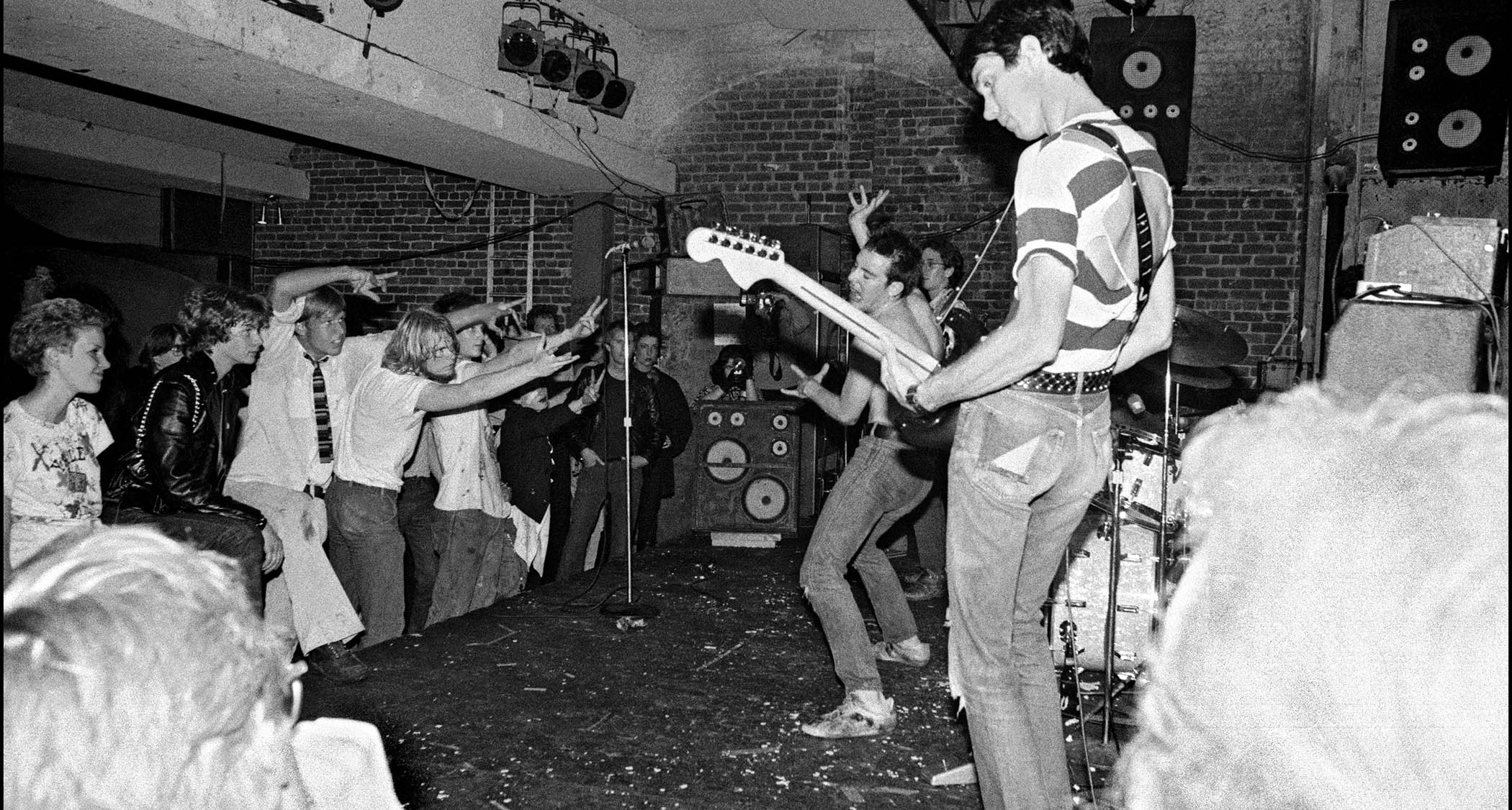“Iggy left the Stooges and had a career – ditto Lou Reed with the Velvet Underground or Morrissey with the Smiths. Where’s Biafra’s solo career?”: East Bay Ray explains why the Dead Kennedys’ chemistry hit its peak on Fresh Fruit... and why it fell apart
In the year 1980, the Dead Kennedys debut presented a new sound for punk. Here guitarist East Bay Ray tells us how they made Fresh Fruit for Rotting Vegetables

All the latest guitar news, interviews, lessons, reviews, deals and more, direct to your inbox!
You are now subscribed
Your newsletter sign-up was successful
When California punks Dead Kennedys released their debut album, 1980’s Fresh Fruit for Rotting Vegetables, they’d already scored a hit single in the U.K. the previous year with California Über Alles.
Riding high on the optimism that overseas success had brought them, the band was determined to capitalize on its momentum, putting in hours of pre-production time in rehearsals prior to going into the studio. Their labors were rewarded, with Fresh Fruit… garnering favorable reviews in the press and charting around the world, though not in the U.S., which was always more resistant to the charms of the early punk bands.
The band split in 1986, with always controversial singer, Jello Biafra, going on to release a number of spoken-word albums and popping up on talk shows espousing his left-of-center political beliefs.
The remaining band members – guitarist East Bay Ray, bass player Klaus Flouride and drummer D.H. Peligro – reformed with a new singer, Brandon Cruz, in 2001. Cruz left after a couple of years, but the band has continued to tour up to the present day, with a number of different singers.
Nowadays, Ray and Flouride are the only remaining original members. Ray is proud of the band’s legacy, and is ready to look back over one of American punk’s seminal albums.
Were you already playing the songs from Fresh Fruit… live before going into the studio, and did they change much during the recording process?
That overdubbed track would be the main guitar, and the original one would be a little less prominent, to help thicken the sound
“Yes, but we did pre-production rehearsals. As I was essentially producing, I had sheets with info about where overdubs would go and what was supposed to happen in certain places. So we knew what we were going to do when we got into the studio, which meant it was a fairly quick process to make the record. We did the whole album, including the mixing, for $6,000.”
All the latest guitar news, interviews, lessons, reviews, deals and more, direct to your inbox!
What was your process in terms of layering guitar parts?
“We were on a very limited budget. We recorded on 16 tracks. What happened was I’d record a guitar track with the bass and drums and then I’d usually overdub a second guitar, hopefully playing it with a few less mistakes. [Laughs]
“That overdubbed track would be the main guitar, and the original one would be a little less prominent, to help thicken the sound, as I’d essentially be attempting to play both parts identically. Some of the solos would be overdubbed as well, of course.”
What guitars and amps did you use?
“My main guitar was a pawn shop Telecaster-style guitar that was made in Japan. I hot rodded it and put in a brass Schecter bridge and a Seymour Duncan PAF pickup at the bridge. I kept the single coil at the neck. For the amp, I was using a ’60s Fender Super Reverb, 40 watts with four 10-inch speakers.
“However, I’m a bit of a science nerd, and I modified it and essentially turned it into a Marshall by wiring one tube into another like the Marshall master-volume style or the early Mesa Boogies. The original Marshall was actually modeled on the Fender Bassman anyway, so I was kind of replicating that approach. [Laughs]”
California Über Alles and Holiday in Cambodia have become classics. Did you have any idea they were going to be special when you recorded them?
“At the time, we were just writing songs and didn’t think any were more significant than others. The original single of Cambodia came out in England in 1979. When we re-recorded it for the album, it ended up being a lot longer, with a lot of stuff we just improvised as we were laying it down. That was how we played our songs live – extending and improvising. Hey, we were a jam band like the Grateful Dead. [Laughs]”
What was the writing process? Was Jello bringing in the songs fully formed?
“We actually wrote as a band, where in effect, due to the chemistry between us, it was a case of two and two equaling five, you know? None of us has had a solo career that was bigger than Dead Kennedys, which, to me, shows the power of a bunch of talented people getting together and creating something that was far greater than the sum of its parts.
Jello didn’t bring in the songs. I know he’s created the myth that he wrote them all, but the question here is that if he did, why didn’t he ever do anything significant after leaving the band
“Jello didn’t bring in the songs. I know he’s created the myth that he wrote them all, but the question here is that if he did, why didn’t he ever do anything significant after leaving the band?
“Iggy left the Stooges and had a career; ditto Lou Reed with the Velvet Underground or Morrissey with the Smiths. Where’s Biafra’s solo career with a bunch of great songs? The songs were written in numerous different ways. Cambodia started as a jam in the rehearsal studio.
“Other times, I’d have ideas for riffs that I’d put on cassettes and Biafra would find lyrics in his notebook. Klaus was important, too, in that he was the most trained musician in the band, and he was good at putting things together. Very few songs were written by one person.”
What got you into playing?
“When I was growing up, my dad was into big band jazz, but he was also into Delta blues players. He took my brother and me to see Lightnin’ Hopkins. After that, the Stones got everybody into Chicago blues, which my dad didn’t like so much, but I did. I never listened to Top 40, but I discovered The Sun Sessions by Elvis Presley. I loved Scotty Moore’s playing with the echo unit.
“I also discovered the first Pink Floyd album with Syd Barrett [1967’s The Piper at the Gates of Dawn]. Anyway, between Scotty and Syd, I decided I had to get an echo unit. I bought a Maestro Echoplex, which I still have. I started experimenting with it and really loved the sound.”
Scotty Moore and Syd Barrett are a long way from Dead Kennedys. What turned you toward punk?
“In the sense that rock ’n’ roll in the mid ’50s and ’60s was a new sound, punk was an extension of that. I saw the Weirdos at a club in L.A. in 1978, and the hairs on the back of my neck stood on end. I just thought, ‘This is it, this is rock ’n’ roll.’ I put the band together soon after that.
“There didn’t seem to be any particular magic in the air when we started rehearsing, but when we started doing shows, something changed. There seemed to be a whole new energy. I think we got confidence. The whole “unknowable chemistry” thing kicked in.”
What did you think of Fresh Fruit for Rotting Vegetables when it came out?
We didn’t know what we were doing when we made the album, so it was a chance to put things right for me. I feel like the remix is like going from 2D to 3D
“It was an amazing feeling to have the record in our hands back then. [Mix engineer] Chris Lord-Alge and I went back into the studio to remix it in 2022, and it was very interesting to listen to those songs after all those years and hear the details.
“After you’re done making a record, you don’t really listen to it again, so I’d never paid much attention to what it sounded like over the years. The remix is much better than the original release, which sounds kinda boxy to me.
“I know people will always love the original and have no time for remixed versions, and I get that. It’s almost like it’s a part of their DNA. That’s the reason we have two versions now – the original and the remix. We didn’t know what we were doing when we made the album, so it was a chance to put things right for me. I feel like the remix is like going from 2D to 3D.”
Has too much happened with Jello to ever think you could work together again in the future?
It’s Biafra that turns down any offers for us to do something; we don’t have any problem. He got caught with his hands in the till and wants to blame us for getting caught
“It’s not an issue for me or Klaus. It’s Biafra that turns down any offers for us to do something; we don’t have any problem. He got caught with his hands in the till and wants to blame us for getting caught, but he should never have put his hands in there in the first place. [The band brought a lawsuit in 2000 accusing Jello Biafra of withholding royalties. Biafra lost and had to pay the band outstanding royalties and punitive damages.]”
What’s going on with the band at the moment?
“Klaus and I have decided to wind things down a bit. We’re reducing the number of shows, and we won’t be doing long tours. We’re not 20 anymore, and we don’t play the kind of music that you can sit down to play. [Laughs]”
- This article first appeared in Guitar World. Subscribe and save.
- Fresh Fruit for Rotting Vegetables is out now via Manifesto.
Mark is a freelance writer with particular expertise in the fields of ‘70s glam, punk, rockabilly and classic ‘50s rock and roll. He sings and plays guitar in his own musical project, Star Studded Sham, which has been described as sounding like the hits of T. Rex and Slade as played by Johnny Thunders. He had several indie hits with his band, Private Sector and has worked with a host of UK punk luminaries. Mark also presents themed radio shows for Generating Steam Heat. He has just completed his first novel, The Bulletproof Truth, and is currently working on the sequel.
You must confirm your public display name before commenting
Please logout and then login again, you will then be prompted to enter your display name.


![Dead Kennedys (San Francisco 1979) [01]. Drug Me (Mabuhay Gardens) - YouTube](https://img.youtube.com/vi/Hi-3ZeTN1M8/maxresdefault.jpg)

